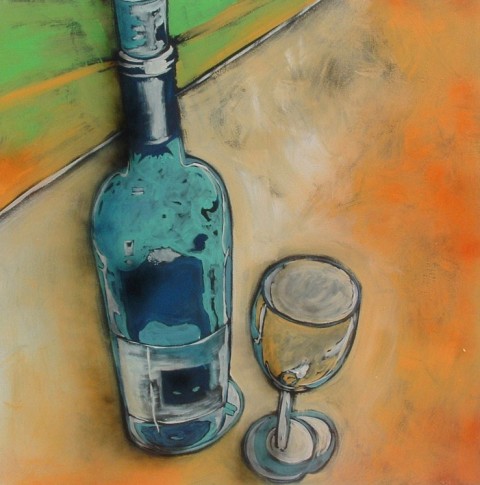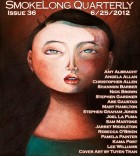Annabelle is taking a bubble bath, sinking down until the bubbles cover her shoulders, downing a second glass of champagne. It’s the first bath she’s taken since she moved into her new apartment. Until now, she’d been opting for showers, quick, ten minutes, in and out like a blink. She wishes she had something to celebrate, a promotion at work or a hot date, but there is no reason except to show herself she’s not afraid to not be afraid.
Annabelle reaches for the bottle of bubbly resting precariously on the soap shelf, the stem of her skinny, now-empty glass dangling between her fingers, and pours herself another drink. She looks again at the bottle’s label, the artwork depicting a woman in a bubble bath who is drinking a glass of champagne. The label woman’s teeth are sparkling white. Annabelle, mouth closed, runs her tongue along her own, knowing how her smile looks in photographs when the flash is too bright.
Annabelle moved here from her little one story house, the one in that neighborhood downtown, because two months ago, on a night when she was taking a bath, not a bubble bath, a bath with water clear as a camera lens, she saw someone outside, looking in at her.
Now, Annabelle looks at the champagne bottle’s label. There are bubbles floating in the air above the label woman’s bubble bath the way bubble bath bubbles always do in cartoons but never do in real life, and Annabelle looks closer and sees, in the floating bubbles, there are smaller illustrations that look like glimpses into the life of the label woman. They are tiny images of disaster: a flood, a fire, a highway accident on an icy road, all rendered in the smallest brushstrokes of watercolor.
Annabelle feels like a voyeur herself and finds herself pleased—no matter how white the label woman’s teeth are, her life has been filled with death and destruction at every turn. The elements, which may treat the label woman so well in her imagined bathroom, have drowned her children, burned the house she grew up in to the ground, killed her husband on his way to work.
Then, suddenly, Annabelle finds herself jealous of the label woman again: those floating floods and fires, no matter how bad they may be, are floating above and away from her, and soon they will pop, cease to exist.
But no, Annabelle thinks, the label woman’s bubbles will never pop because they are suspended, unmoving and unchanging and unpoppable. The label woman will never be able to move on from the worst moments of her life. She will be stuck in that bathroom with those bubbles forever, forever put on display on grocery store shelves, the skin on the tips of her fingers permanently puckered.
Then Annabelle reminds herself the label woman is only an illustration, a mascot designed to sell champagne, probably to people like Annabelle who dream of being drunk and carefree in bubble baths where bubbles rise from the water and float dreamlike above the bath before coming to a satisfactory pop, or never coming to one at all.
In another bubble floating above the label woman’s bubble bath, Annabelle sees another woman, taking a bubble bath and sipping champagne from a skinny glass. For a moment, she thinks it looks like her, but this new woman’s nose is too small, her eyes too big.
Annabelle wishes she had eyes like microscopes so she could see if, in the bubbles floating above the woman in the bubble bath in the bubble floating above the label woman’s bubble bath, there might be images from this woman’s life too, or maybe another woman taking a bubble bath, whose bubble bath bubbles hold another woman in a bubble bath whose bubbles hold another woman in a bubble bath, and on and on, ad infinitum, until finally Annabelle might see herself in the bubble of someone else’s bath, might see herself looking deep into the champagne label at herself, and then, even if the feeling of someone watching her never went away, she could be sure she was watching herself, too, keeping watch.
Annabelle is afraid of fogged breath appearing on her bedroom window, of an eye looking in at her eye after a late-night knock, even though she knows there’s no way, not here. She knows sometimes it’s easier to feel like you’re being watched: at work, for instance, or in convenience stores with cameras in the corners, but there’s something perverse about this, even besides the pervert, besides the potential danger. She feels stuck in a performance, not wanting someone to see what she’s like when alone—the way she waits for candy bars to begin melting on her fingers before the first bite, the way she apologizes sincerely to her phone and cradles it like a child after throwing it in frustration, the way she stares long and hard at champagne bottles. Now, these are things she feels embarrassed to find herself doing.
Annabelle sets the bottle down on the edge of the tub, certain the women wouldn’t like her looking. She looks instead into the bubbles in the champagne in her skinny glass. In a moment, she knows, she will drink her drink and drain her bath and toss the bottle into the recycling bin and nothing will be left bubbling. For now, she looks at the bubbling bubbliness as it bubbles to the surface, turning into air, unable to be seen, invisible.



 The core workshop of SmokeLong Fitness is all in writing, so you can take part from anywhere at anytime. We are excited about creating a supportive, consistent and structured environment for flash writers to work on their craft in a community. We are thrilled and proud to say that our workshop participants have won, placed, or been listed in every major flash competition. Community works.
The core workshop of SmokeLong Fitness is all in writing, so you can take part from anywhere at anytime. We are excited about creating a supportive, consistent and structured environment for flash writers to work on their craft in a community. We are thrilled and proud to say that our workshop participants have won, placed, or been listed in every major flash competition. Community works.